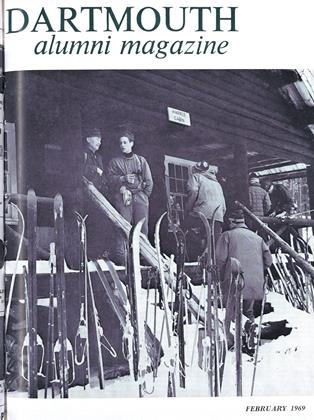In the wake of the case of four students disciplined by the faculty-student Committee on Standing and Conduct for their part in obstructing interviews on campus by Army recruiters (see this month's Undergraduate Chair), the Faculty Committee on Organization and Policy and the Executive Committee of the Faculty decided that the time had come to remind the Dartmouth community that the policy statement on freedom of expression and dissent adopted last June was not pliable and ambiguous, and that there had also been adopted at the same time an implementing action that gave it some teeth.
Everyone has been referring to the faculty's policy statement as "guidelines," with consequent softness in the acceptance of its conditions, but last month's reminder addressed to students and faculty called attention to this supplementary vote:
That the Faculty of Arts and Sciences requests the Officers of the College, and all appropriate agencies of the Faculty and the student body, to communicate this policy to all segments of the Dartmouth community in such a way that it may be understood that membership in this community carries with it, as a necessary condition, the agreement to honor and abide by this policy.
The main policy statement was adopted by the Faculty of Arts and Sciences at its meeting of June 3, 1968, and subsequently endorsed by the Trustees. It was prepared by a special student-faculty Committee on Dissent and approved by the Executive Committee of the Faculty before going to the full faculty. The policy statement is as follows:
Dartmouth College prizes and defends the right of free speech, and the freedom of the individual to make his own decisions, while at the same time recognizing that such freedom exists in the context of law and of responsibility for one's actions. The exercise of these rights must not deny the same rights to any other individual. The College therefore both fosters and protects the rights of individuals to express dissent. Protest or demonstration shall not be discouraged, so long as neither force nor the threat of force is used, and so long as the orderly processes of the College are not deliberately obstructed.
Establishment of a Committee on Freedom of Expression and Dissent has been recommended to the Executive Committè of the Faculty but has not yet been activated. When the committee, made up equally of students and faculty members, is organized, it is expected that the pres- ent controlling policy will come in for review. Meanwhile the faculty's policy statement is policy, not just a guideline, and paragraph two goes with paragraph one.
 View Full Issue
View Full Issue
More From This Issue
-
 Feature
FeatureTHE UNSUNG HERO OF THE DARTMOUTH COLLEGE CASE
February 1969 By Susan Liddicoat -
 Feature
FeatureThe Bearing of the Green
February 1969 By Mary B. Ross ('38) -
 Feature
FeatureA Call for Equal Opportunity
February 1969 -
 Feature
FeatureA Student View of the Crisis, 1816-19
February 1969 -
 Article
ArticleTrustees and Alumni Council Meet
February 1969 -
 Article
ArticleThe Undergraduate Chair
February 1969 By CHRIS KERN '69







